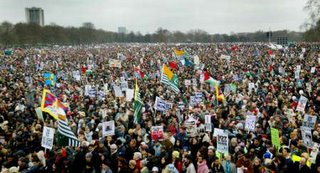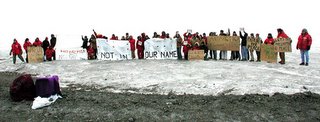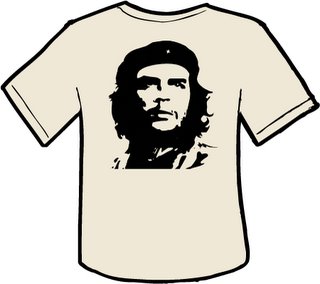A month or so back a lot of American bloggers put together a list of their ten worst Americans. The lists are varied, and often partisan, but it was a fun thing to do. So I thought I'd start a New Zealand version. I'm encouraging all other New Zealand bloggers to join in and name your worst (if you don't have a blog it'd be cool if you could leave a list in the comments).
Maia's List of 10 Worst New Zealanders (in chronological order):
Just by way of introduction, I've focused on people with power, because they can do so much more damage. I've also tried not to cover the same historical period more than once. I'll probably think of better people tomorrow, I also know more about twentieth century New Zealand history than 19th, so it's a little unbalanced.
Edward Gibbon Wakefield Colonist: I've spent most of my life in Wellington, he could make the list just because he decreed a grid system for Wellington's roads, from London, when he'd never seen our hills.
But no he's on this list for his aim to create a better Britain. With all the classes (someone has to do the work), but without the pesky class antagonism. He wanted to ensure that poor people weren't able to live off the land, so there'd be enough workers for the capitalists to exploit. He didn't seem to mind much that there were people already living there.
John Bryce There is an element of randomness that means that I choose this particular MP, cabinet minister, and military commander to represent the MPs, cabinet ministers, and military commanders that colonised this country. But he showed such bravery defending his home in Wanganui when he attacked a group of unarmed Maori children, and killed two of them, that I had to include him.
As minister of Native Affairs his focus was on strengthening government power and alienating Maori land. In 1880, when he was governer, resistance was primarily from Te Whiti and Parihaka. He was all about crushing this dangerous non-violence movement that was occupying land, so crush it he did. He threatened to resign when parliament wouldn't pass repressive enough laws, and then, when he did resign, he went off to personally supervise the invasion.
Robert Logan, Military Leader: When World War I broke out Britain asked New Zealand to annexe Western Samoa, which was currently colonised by Germany. We thought that a miny empire seemed like a good idea the project was described as 'a great and urgent Imperial Service' and Robert Logan was the man to do the job. Now if all he'd done was invade a country, I'd probably blame his political masters who ordered it. It was the way he administered the country once he'd has his invading fun that earns him a place on this list (and when I put him on this list I didn't know about his appalling treatment of Chinese indentured labourers - or slaves as they're more commonly known).
Most specifically in November 1918 there was a world-wide flu pandemic, which had already hit New Zealand. The Talune sailed from New Zealand to Samoa, and it was obvious that some people on board were sick with influenza, but it wasn't put into quarantine. Three weeks later 7,542 Samoans - 20% of the population - had died.
Those who made Gallipoli a myth The myth of the ANZACs as the creators of some great (and important) national identity is so pervasive, that I have no idea who started making it.
Those kids did not earn anything with their deaths, they ordered to slaughter and be slaughtered, plain and simple. Much as I hate those who gave the orders, the vultures who came after and used the carcases of those boys to maintain their power are worse.
The McMillan inquiry A government inquiry into illegal abortion (it's a bit of a cheat, but if I have to choose an individual I'll choose Dr Paget, who I quote): In the 1930s there was an increase in illegal abortion in New Zealand. A fact that should surprise no-one who knew there was a depression at this time. A lot of the women who have written about their life in the 1930s have talked about illegal abortions, and women who died from them.
The inquiry wasn't exactly made up of feminists, one member asked an advocate of birth control: "You think a woman could be considered to have done her duty to the state if she had three children?" But women came forward and described their lives. It doesn't take much to listen to stories of depression and poverty, and abortion to joina few dots.
The inquiry's response wasn't so big on the dot joining:
"The report identified two main strategies aimed at reducing the incidence of abortion - controlling the flow of birth control information by constraining it to medical channels, and imploring women to be less selfish. The role of the state would be "to appeal to the womanhood of New Zealand, in so far as selfish and unworthy motives have entered into our family life, to consider the grave phsyical and moral dangers, not to speak of the dangers of race suicide, which are involved
If they were going to be such racist, sexist assholes, the least they could have done was provide some serious money, because the actual women were having abortions, was because they couldn't afford to have children.
Peter Fraser Labour Prime Minister 1940-1949: I think he'd earn this just by being jailed for sedition for criticising conscription during World War One, and then jailing conscientious objectors in World War One, who went on to jail conscientious objectors in World War Two. "That war was a nasty imperialist war, but this war is hugs and puppies."
But he was also New Zealand's representative to the United Nations, where we advocated putting a man's right to a family wage into the declaration of human rights. He thought paying women less than men was a human right.
Finton Patrick Walsh Trade Union Leader: I distrust anyone who holds that much power, particularly a trade union leader. Maintaining your own power often runs contrary to the needs of building a movement. But having and maintaing a lot of power (and making a ton of money for himself in the process), isn't why he's on my list.
He's on my list because of 1951. I just wrote about it, he sold out the waterside workers, there isn't much more to say (he is also a stand-in for Ken Douglas, as I didn't think I could have both Ken Douglas and David Lange).
Robert Muldoon National Party Prime Minister 1975-1984: It feels a little bit cheap - he is, after all, the easy shot. But I loathe and detest him with such a fiery passion, that I once kicked the "opened by Prime Minister Robert Muldoon" plaque at the National Library (I'd been doing some research about abortion legislation - you'd kick him too). You could hate him for being anti-abortion on Monday, attacking the DPB on Tuesday, wage and price freezes on Wednesday, Health & Education cuts on Thursday, Dawn Raids on Friday, Bastion Point on Saturday and extending the powers of the SIS on Sunday. And that's without even getting into the tour.
I know it's easy to make fun of him (after all I grew up thinking his first name was 'piggy'); I know that there is a concerted effort to use his policies as an excuse for what the following Labour government did. That doesn't make him any less awful.
David Lange Labour Party Prime Minister 1984-1988: I chose him, of all the 4th Labour government fuckwits, because he tries to weasel his way out of responsibility. He was always the right-wing candidate within Labour, and he rose to power with the support of Douglas and Prebble. That government is his responsibility.
He gets all the credit for the anti-nuclear legislation (which he had to be dragged by his caucus kicking and screaming), but doesn't get blamed for the poverty and misery and economic havoc his government caused. I hold him repsonsible for every railway worker who has died since our railways have been privatised.
Names Suppressed occupation suppressed:
Four rapists are currently appealing their conviction for raping a woman some years ago. Two of them have name suppression. They represent all the men who have raped, beaten and murdered women, for their own personal gratification, and to maintain their power.
All material or quotes are from the
Dictionary of New Zealand Biography, except the McMillan Commission which is from Helen Smythe's
Rocking the Cradle: Contraception, Sex and Politics in New Zealand












